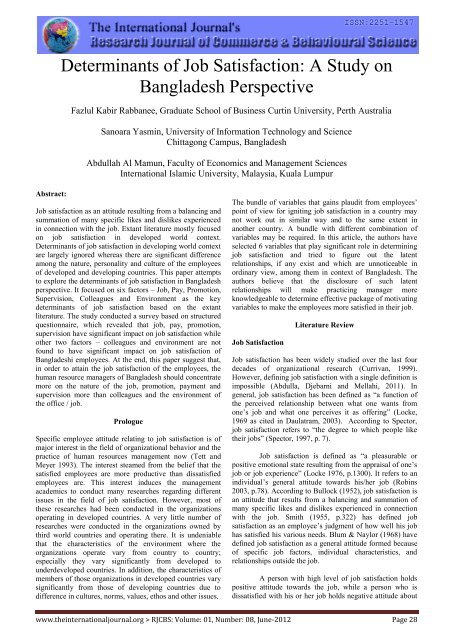Research Journal of Commerce & Behavioural Science - RJCBS
Research Journal of Commerce & Behavioural Science - RJCBS
Research Journal of Commerce & Behavioural Science - RJCBS
You also want an ePaper? Increase the reach of your titles
YUMPU automatically turns print PDFs into web optimized ePapers that Google loves.
Determinants <strong>of</strong> Job Satisfaction: A Study on<br />
Bangladesh Perspective<br />
Fazlul Kabir Rabbanee, Graduate School <strong>of</strong> Business Curtin University, Perth Australia<br />
Sanoara Yasmin, University <strong>of</strong> Information Technology and <strong>Science</strong><br />
Chittagong Campus, Bangladesh<br />
Abdullah Al Mamun, Faculty <strong>of</strong> Economics and Management <strong>Science</strong>s<br />
International Islamic University, Malaysia, Kuala Lumpur<br />
Abstract:<br />
Job satisfaction as an attitude resulting from a balancing and<br />
summation <strong>of</strong> many specific likes and dislikes experienced<br />
in connection with the job. Extant literature mostly focused<br />
on job satisfaction in developed world context.<br />
Determinants <strong>of</strong> job satisfaction in developing world context<br />
are largely ignored whereas there are significant difference<br />
among the nature, personality and culture <strong>of</strong> the employees<br />
<strong>of</strong> developed and developing countries. This paper attempts<br />
to explore the determinants <strong>of</strong> job satisfaction in Bangladesh<br />
perspective. It focused on six factors – Job, Pay, Promotion,<br />
Supervision, Colleagues and Environment as the key<br />
determinants <strong>of</strong> job satisfaction based on the extant<br />
literature. The study conducted a survey based on structured<br />
questionnaire, which revealed that job, pay, promotion,<br />
supervision have significant impact on job satisfaction while<br />
other two factors – colleagues and environment are not<br />
found to have significant impact on job satisfaction <strong>of</strong><br />
Bangladeshi employees. At the end, this paper suggest that,<br />
in order to attain the job satisfaction <strong>of</strong> the employees, the<br />
human resource managers <strong>of</strong> Bangladesh should concentrate<br />
more on the nature <strong>of</strong> the job, promotion, payment and<br />
supervision more than colleagues and the environment <strong>of</strong><br />
the <strong>of</strong>fice / job.<br />
Prologue<br />
Specific employee attitude relating to job satisfaction is <strong>of</strong><br />
major interest in the field <strong>of</strong> organizational behavior and the<br />
practice <strong>of</strong> human resources management now (Tett and<br />
Meyer 1993). The interest steamed from the belief that the<br />
satisfied employees are more productive than dissatisfied<br />
employees are. This interest induces the management<br />
academics to conduct many researches regarding different<br />
issues in the field <strong>of</strong> job satisfaction. However, most <strong>of</strong><br />
these researches had been conducted in the organizations<br />
operating in developed countries. A very little number <strong>of</strong><br />
researches were conducted in the organizations owned by<br />
third world countries and operating there. It is undeniable<br />
that the characteristics <strong>of</strong> the environment where the<br />
organizations operate vary from country to country;<br />
especially they vary significantly from developed to<br />
underdeveloped countries. In addition, the characteristics <strong>of</strong><br />
members <strong>of</strong> those organizations in developed countries vary<br />
significantly from those <strong>of</strong> developing countries due to<br />
difference in cultures, norms, values, ethos and other issues.<br />
The bundle <strong>of</strong> variables that gains plaudit from employees’<br />
point <strong>of</strong> view for igniting job satisfaction in a country may<br />
not work out in similar way and to the same extent in<br />
another country. A bundle with different combination <strong>of</strong><br />
variables may be required. In this article, the authors have<br />
selected 6 variables that play significant role in determining<br />
job satisfaction and tried to figure out the latent<br />
relationships, if any exist and which are unnoticeable in<br />
ordinary view, among them in context <strong>of</strong> Bangladesh. The<br />
authors believe that the disclosure <strong>of</strong> such latent<br />
relationships will make practicing manager more<br />
knowledgeable to determine effective package <strong>of</strong> motivating<br />
variables to make the employees more satisfied in their job.<br />
Job Satisfaction<br />
Literature Review<br />
Job satisfaction has been widely studied over the last four<br />
decades <strong>of</strong> organizational research (Currivan, 1999).<br />
However, defining job satisfaction with a single definition is<br />
impossible (Abdulla, Djebarni and Mellahi, 2011). In<br />
general, job satisfaction has been defined as “a function <strong>of</strong><br />
the perceived relationship between what one wants from<br />
one’s job and what one perceives it as <strong>of</strong>fering” (Locke,<br />
1969 as cited in Daulatram, 2003). According to Spector,<br />
job satisfaction refers to “the degree to which people like<br />
their jobs” (Spector, 1997, p. 7).<br />
Job satisfaction is defined as “a pleasurable or<br />
positive emotional state resulting from the appraisal <strong>of</strong> one’s<br />
job or job experience” (Locke 1976, p.1300). It refers to an<br />
individual’s general attitude towards his/her job (Robins<br />
2003, p.78). According to Bullock (1952), job satisfaction is<br />
an attitude that results from a balancing and summation <strong>of</strong><br />
many specific likes and dislikes experienced in connection<br />
with the job. Smith (1955, p.322) has defined job<br />
satisfaction as an employee’s judgment <strong>of</strong> how well his job<br />
has satisfied his various needs. Blum & Naylor (1968) have<br />
defined job satisfaction as a general attitude formed because<br />
<strong>of</strong> specific job factors, individual characteristics, and<br />
relationships outside the job.<br />
A person with high level <strong>of</strong> job satisfaction holds<br />
positive attitude towards the job, while a person who is<br />
dissatisfied with his or her job holds negative attitude about<br />
www.theinternationaljournal.org > <strong>RJCBS</strong>: Volume: 01, Number: 08, June-2012 Page 28
















